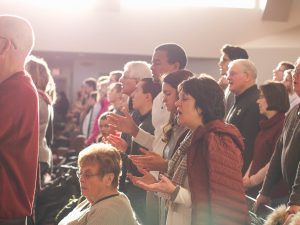After one of the first talks I gave as a P2C-Students staff member, encouraging students to take their relationship with God seriously, I received this email from a student:
“I’m not going to a church, so it’s just me and my relationship with God while I’m here… But that’s slowly been strengthening… Kind of on my own terms… Which works!!! And I’m working on making my relationship less about me and more about God…”
I almost tripped over myself while reading her email and walking down the street. (Which is a different lesson on the hazards of reading and walking at the same time.)
I was startled because after I had encouraged and exhorted students to take their relationship with God seriously, our well-meaning student had decided that taking her relationship with God seriously included not going to church. It was ironic.
But also honest. At least she knew that as evangelicals we emphasize church attendance. She reasoned that since we emphasize our personal relationship with God if we can get the same elements of church outside church, why should we go to church?
With so many online sermons on demand, endless worship music playlists, and a French press in my cupboard, why should I really go to a physical church and stand and sit and pretend to like the hipster worship leader, who may or may not be good-looking, and get yelled at, or not, through a mediocre sermon while sipping tepid coffee that may, or may not, be burnt?
Evangelical millennials and post-millennials (those of us born between the early 80’s and mid 2000’s) need a better theology of the church and church membership. So indulge me in a few black and white sound-bytes if you will.
1. Church is not about satisfaction, but about sanctification
The functional, inner theology, of millennials and post-millennials is satisfaction. How did the music make me feel? What about the sermon? Was it authentic?
Listening to sermons and songs alone does not sanctify us.
How did we get to the place where the preaching of God’s Word has become more about our emotional satisfaction than our habits and behaviours?
Listening to sermons and songs alone does not sanctify us. Sanctification is not only about some inward attitude change. Sanctification is an inward attitude change that is translated into physical, bodily change. “Do I feel peace?” needs to become, “Am I living peaceably with people around me?”
Church, a gathering of Christian believers, is the physical location for these opportunities. It allows us to practise the 100 or so “one-another” commands that Christ commands: “bear one another’s burdens” (Gal 6:2), “confess your sins to one another and pray for one another” (James 5:16). This working out of salvation in the beautiful mess of community is the place God has designed for our sanctification.
2. Church is not about individuals, but about the Body
Check out all these verses about the “body” of Christ:
For just as the body is one and has many members… so it is with Christ. For in one Spirit we were all baptized into one body—Jews or Greeks, slaves or free—and all were made to drink of one Spirit.
For the body does not consist of one member but of many.
If the foot should say, “Because I am not a hand, I do not belong to the body,” that would not make it any less a part of the body. And if the ear should say, “Because I am not an eye, I do not belong to the body,” that would not make it any less a part of the body.
If the whole body were an eye, where would be the sense of hearing? If the whole body were an ear, where would be the sense of smell? But as it is, God arranged the members in the body, each one of them, as he chose. If all were a single member, where would the body be? As it is, there are many parts, yet one body.
The eye cannot say to the hand, “I have no need of you,” nor again the head to the feet, “I have no need of you.”
1 Corinthians 12:12-21 (emphasis added)
But God has so composed the body… that there may be no division in the body, but that the members may have the same care for one another.
Now you are the body of Christ and individually members of it.”
1 Corinthians 12:24b-27 (emphasis added)
When you were baptized, you were not just baptized into Christ. You were baptized into his Body, the community of saints. The local church is the local extension of Christ’s Body. “You are the body of Christ and individually members of it” (1 Cor 12:27).
This is why some churches’ baptism services include vows from the new believer and the community. To not be involved in a local church is to diminish being united with Christ and his Body.
To not be involved in a local church is to diminish being united with Christ and his Body.
This is also why in the same passage God tells us that the eye cannot say to the hand, “I have no need of you” (1 Cor 12:21). To not be involved in a local church is to diminish the gifts and role that you are expected to play in Christ’s Body, and the gifts and role that other members have to play in your life.
3. Church is not about emotion, but about mission
Which brings us to our third point. As you continue to share your faith with those who not yet know Jesus, does it not seem hypocritical to invite someone to receive Christ (to be united with Christ and his Body) when you yourself are not living in Christ’s Body?
Into what community are you going to invite your new-believer friend? How can you take the Great Commission seriously, “baptizing them into the name of the Father, Son and Holy Spirit,” if you aren’t involved in a local church that can baptize a new believer? Which brings us to a final point about church community.
4. Church is not about consumption, but about communion
What is communion? Think “common-union”. When God the Father brings us into life with him through the sacrificial death of Christ, we are united with him by the power of the Holy Spirit. This is “union.” When he saves us, he also saves us into life with his chosen people; a community in “common.” Communion is therefore our redemption out of sin by God and into common union with him and each other.
Salvation is both union with God and union with one another. This is our salvation.
You therefore cannot enact or receive communion by yourself.
At one level this means we are saved for Christian interdependent relationships. At another level this means reality is enacted each time we participate in the Communion service. Just as in how I don’t save myself, I cannot give myself the bread and the wine/juice to remember the death of Christ. Neither can a computer screen.
Someone physical gives these elements to me and those with whom I share local church. We receive it as a proclamation of our salvation through Christ’s sacrifice. When we neglect church attendance, we are neglecting Christ’s command to “do this in remembrance of me” as a community proclamation of Christ’s death until he returns (1 Cor 11:23-26).
In light of all these things, here are some tips in finding a good and healthy church community in which you can immerse yourself. They are all equally important.
Look for a church that:
- Worships Jesus Christ, preaches the biblical gospel, and practises communion and baptism.
- Encourages service. The church offers opportunities for you to serve and practise Christ-like behaviour and pursue sanctification. We are not talking about glamorous or spotlight opportunities, we are talking about opportunities for you to serve: children’s ministry, small groups, compassion ministries, hospitality, prayer, outreach, etc.
- Encourages mission. The church encourages you to bring your non-Christian friends and to share the gospel with them. As a larger community they are concerned with, in word and deed, those who do not know Jesus.
- Encourages community. The church takes relationships, accountability and one-anothering seriously. There are opportunities for you to be involved in smaller groups and to develop Christ-centred relationships with people of all ages. A healthy Christ-like community loves, values and encourages members of all ages to love and serve one another.
You’ll notice that I didn’t mention anything about preaching styles, music, venues, size or denomination. I think you know why; these things are not foundational. Check out this blog if you’re looking for further suggestions on finding a local church this year.
Your next steps:
- No church? Start researching. Ask your friends on Facebook. Or walk around the neighbourhood, write a list of churches, and look up their websites. Pick somewhere to attend this weekend and show up. Connect with the pastor or staff to let them know that you’re new and want to get involved. Ask about joining a small group. You’ll be surprised at how many pastors want to invest in university/college-aged people.
- Stop shopping. It is okay to visit a few churches when first looking, but no church is perfect except in the New Heavens and the New Earth. Look for the ingredients I recommended and settle into one place. Consider attending for a minimum of four weeks in a row before making a decision to stay or go. If you think that the church has the right intentions and vision but just lacks manpower, ask yourself how you can contribute your gifts and strengths.
- Are you currently connected to a local church, however loosely? Immerse yourself a bit more. Show up this Sunday. Bring your Bible, and something to take notes and engage in the message. Inquire about joining a small group for the summer and be persistent to make it happen. Try to connect with older members to grab a coffee with them. You think it might be awkward? So what? Seek wisdom.
This is what heaven is going to be like, and you are missing out on a little piece of heaven when you only look for something that perfectly fits your profile.
Finding a church may not be easy. But this uneasiness is to sanctify you by helping you stretch a little out of your comfort zone and learn to worship God with other brothers and sisters who are different than you in age, socioeconomic status, or race. This is what heaven is going to be like, and you are missing out on a little piece of heaven when you only look for something that perfectly fits your profile.
But neither is finding a church supposed to be hard. We live in the West where even in our post-Christian culture God is still alive and active through his Spirit in local communities all over the place. We don’t live in the unreached world. Just look a little more intently where you’re at to see how God is already at work through a local community.
Hopefully this helps you see why church matters, what church is all about, and how to find a local church. Church is about sanctification, the body of Christ, mission, and communion. We need the church, to gather with fellow Christian believers, and it gives us a taste of heaven.
"*" indicates required fields
Share this!
About the Author





